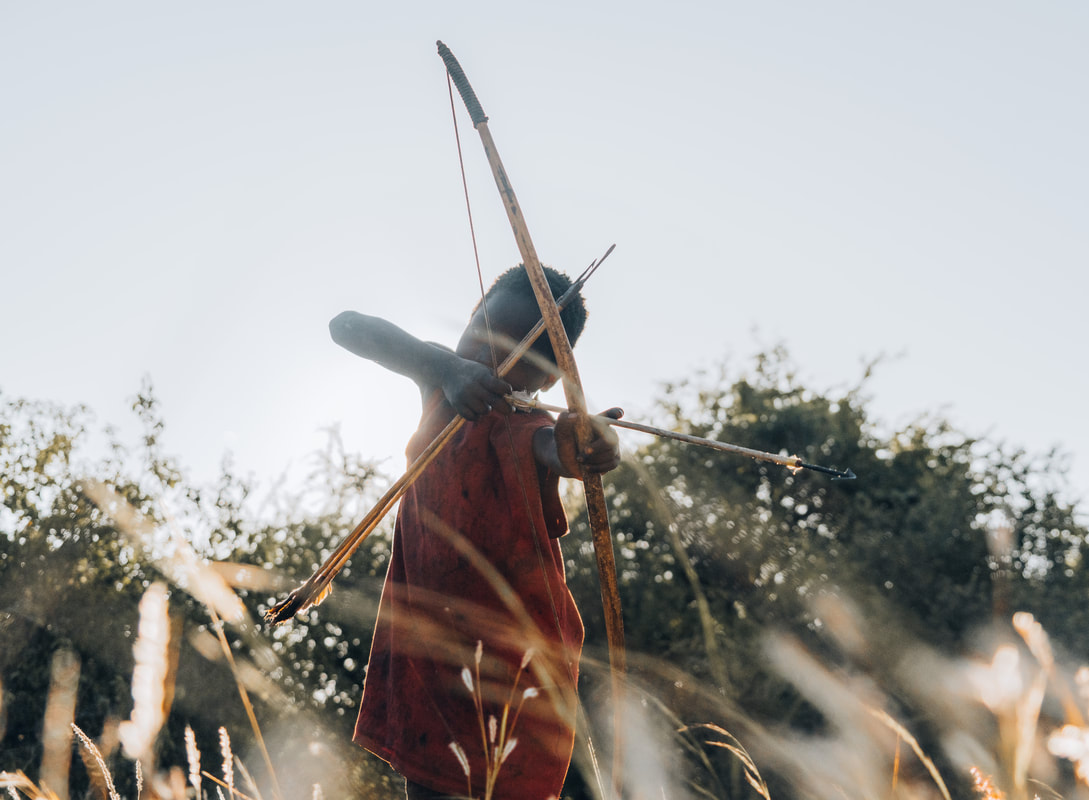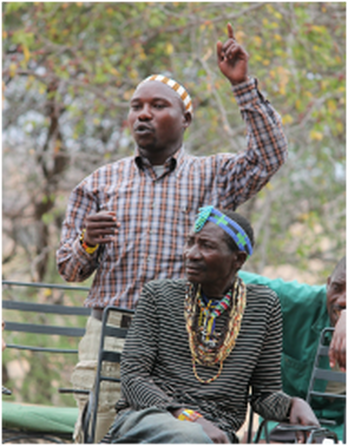Securing Land Rights for the Hadzabe
The Hadzabe are an ancient group of hunter-gatherers who have likely lived in the Lake Eyasi basin for some 80,000 years or more. They are one of the original peoples. Despite their long history, the Hadzabe have gradually been displaced from their land: within the last 50 years, the Hadzabe have lost over 90% of their land to outsiders encroaching on their land for grazing and farming.
|
To ensure their survival it is essential to make sure the Hadzabe have rights to their land, to secure their land tenure, and to protect their livelihoods through innovative means. As it became clear that the Hadzabe land rights were being severely infringed upon, UCRT began working with the largest remaining Hadzabe settlement in the Yaeda Valley. The Hadzabe and other communities in the area did not know their rights in terms of the law and the land, and at the same time they did not have the resources available to carry out the complicated and long process for securing village and other land certificates (titles) themselves. Through participatory land use planning, lobbying and advocacy, UCRT was able to help the Hadzabe secure rights to their own village, Mongo wa Mono, the only Hadzabe-majority village in Tanzania. We assisted the community in developing a land use plan and village by-laws.
With all the basics in place, UCRT then worked with local communities, district officials and the Ministry of Lands to pilot a different, and stronger, mechanism to secure communal land rights: a group Certificate of Customary Right of Occupancy (CCRO). UCRT assisted the Hadzabe to apply for a communal CCRO, in each of the modern villages that cut across their ancient domain. UCRT’s work with the Hadzabe has been extremely successful, culminating in obtaining the title deeds for the customary rights of occupancy for over 20,000 hectares of land for them. UCRT has also worked with pastoralists in the area to secured access to and the protection of their communal lands through obtaining these Customary Rights of Occupancy for their grazing lands. As a consequence of the now clearly demarcated and titled land overt conflicts between agriculturalists and pastoralists have declined.
With the land now legally certified through CCROs, an opportunity opened up for the Hadzabe community to additionally benefit from carbon payments for conserving their woodlands in collaboration with Carbon Tanzania, a local forest carbon project developer that generates and sells certified carbon offset credits. The partnership between the Hadzabe and Carbon Tanzania, facilitated by UCRT, is working because the interests of each party are closely aligned: Carbon Tanzania’s mission is to promote community-based conservation, and the Hadzabe would like to protect and live in their last remaining wild lands indefinitely.
After years of laying the groundwork, in 2013, the Hadzabe of Mongo wa Mono and Domanga received more than $30,000USD for sustainably managing their land and forests – this was just the first of what has become regular bi-annual payments.
With all the basics in place, UCRT then worked with local communities, district officials and the Ministry of Lands to pilot a different, and stronger, mechanism to secure communal land rights: a group Certificate of Customary Right of Occupancy (CCRO). UCRT assisted the Hadzabe to apply for a communal CCRO, in each of the modern villages that cut across their ancient domain. UCRT’s work with the Hadzabe has been extremely successful, culminating in obtaining the title deeds for the customary rights of occupancy for over 20,000 hectares of land for them. UCRT has also worked with pastoralists in the area to secured access to and the protection of their communal lands through obtaining these Customary Rights of Occupancy for their grazing lands. As a consequence of the now clearly demarcated and titled land overt conflicts between agriculturalists and pastoralists have declined.
With the land now legally certified through CCROs, an opportunity opened up for the Hadzabe community to additionally benefit from carbon payments for conserving their woodlands in collaboration with Carbon Tanzania, a local forest carbon project developer that generates and sells certified carbon offset credits. The partnership between the Hadzabe and Carbon Tanzania, facilitated by UCRT, is working because the interests of each party are closely aligned: Carbon Tanzania’s mission is to promote community-based conservation, and the Hadzabe would like to protect and live in their last remaining wild lands indefinitely.
After years of laying the groundwork, in 2013, the Hadzabe of Mongo wa Mono and Domanga received more than $30,000USD for sustainably managing their land and forests – this was just the first of what has become regular bi-annual payments.
After clear boundary identification in our sub-village illegal dwellers returned to their villages. Since then, animals like elephant, kudu and impala are increasingly seen because there are not houses everywhere like before. There is a big difference in the surrounding forest compared to years back because of reduced livestock grazing. The payments we receive from Carbon Tanzania are spent on school fees for Hadzabe students from Mongo wa Mono to study at Secondary Schools as well as hospital bills for community members and we buy maize to be shared during the times of hunger. The community scouts are also paid from this money, and they take care of our forest for us to stop illegal cutting of trees and grazing at times when it is prohibited. We also used the money to buy a machine to generate income for the community by grinding maize for surrounding villages. We are thankful to UCRT and Carbon Tanzania for this income that is so important to our welfare.” -Athumani Magandula, resident of Mongo wa Mono and Chairman of the Hadzabe Survival Council. |
Copyright 2020 Ujamaa Community Resource Team - All Rights Reserved


